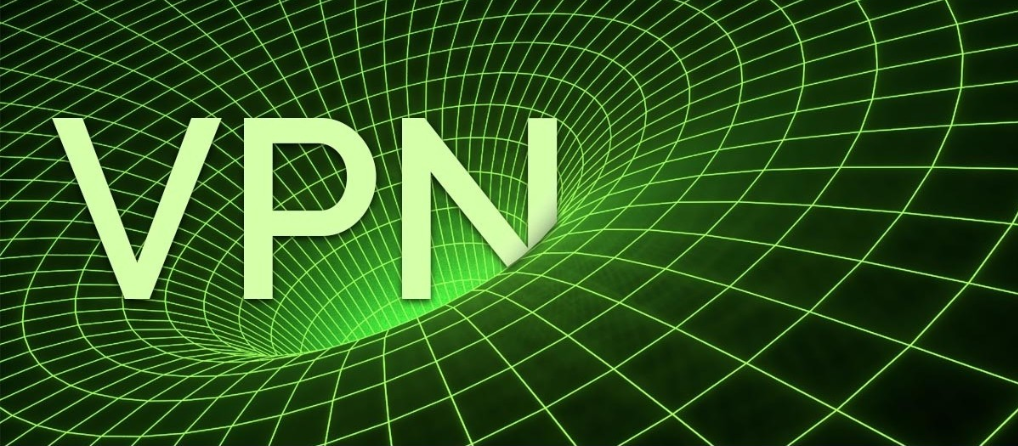
We will explain to you what a VPN connection is, what it is for, and its advantages. VPN connections are by no means a new invention, but it is now that they are beginning to gain traction among the general public. While traditionally, its use was more common in the business environment, the great versatility of this type of connection and its multiple uses make it increasingly popular with great services such as NordVPN.
It is precisely this versatility that we were talking about that creates some confusion about what exactly these VPNs are since VPN connections are increasingly related to ” evil ” (with big quotes) since some of their applications include the jump of the geographic blocks, greater anonymity in the Network or even the blockade of the publicity.
What is a VPN
Let’s start with the basics. VPN stands for Virtual Private Network, or virtual private Network, which, unlike other more cryptic computer words such as DNS or HTTP, does give us fairly precise clues as to what they consist of.
The key word here is virtual since this property creates the need for the VPN itself, as well as what allows VPN connections to offer you the many uses that we will see later.
To connect to the Internet, your mobile, PC, television, and other devices generally communicate with the router or modem that connects your home to your Internet provider, either by cable or wirelessly. The components are different if you use your mobile data connection (which includes its modem and talks to the cell tower), but the essence is the same: your device connects to another, which connects you to the Internet.
The most normal thing is that you do not have one, but several devices connected to the same router: mobile phones, computers, consoles… In this case, each one will be assigned a local IP address, which is not visible from the Internet. This is a local network, a set of devices connected so that they can share files and printers without going through the Internet.
A VPN connection allows you to create a local network without needing its members to be physically connected, but rather through the Internet. It is the “virtual” component that we talked about before. With greater flexibility, you get the advantages of the local Network (and some extra) since the connection is through the Internet and can, for example, be from one end of the world to the other.
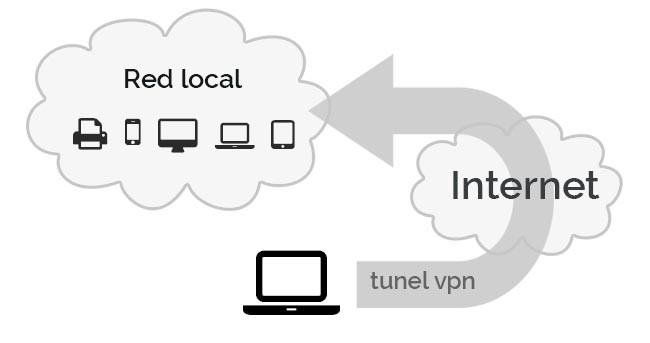
However, it is another quirk of VPN connections that is making them so fashionable today: data tunnels. Normally, while you use the Internet, your device contacts your Internet provider, which is the one that connects with the different web services to offer you, for example, YouTube videos.
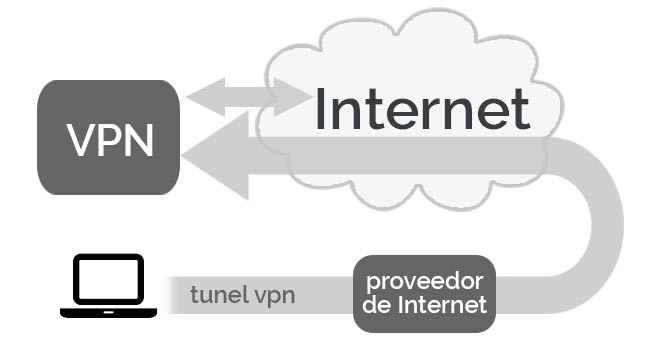
When you connect to a VPN connection, this changes. All your network traffic is still going from your device to your Internet provider, but from there, it goes directly to the VPN server, from where it will depart to the destination. Ideally, the connection is encrypted, so your Internet provider doesn’t know what you’re accessing. For all practical purposes, your IP address is that of the VPN server: in many ways, it’s as if you were physically there, connecting to the Internet.
VPNs can be used in three ways on your PC. You can automatically add them from the settings, install applications with them, or use VPN extensions.
What are VPN connections for?
Surely with the previous explanations, you have already imagined a few situations in which VPN connections could be useful. It is an open secret that they are especially important in the corporate environment, but their uses do not end there, far from it. These are the main uses of VPN connections.
TeleworkingThe most obvious use of a VPN connection is interconnectivity in networks that are not physically connected, such as workers who are currently out of the office or companies with branches in several cities that need access to a single private network.
From a security point of view, allowing indiscriminate access to a company’s network from the Internet is nothing short of crazy. Even if access is protected with a password, it could be captured on a public Wi-Fi hotspot or spotted by a malicious eavesdropper.

On the contrary, the risk decreases if the worker and the company connect through a VPN. Access is protected, the connection is predictably encrypted, and the worker has the same access as if they were in person.
Avoid censorship and geoblocking of contentWith the heyday of the Internet and the mischief of content providers and users, other more playful uses of VPN connections have become popular, many of them related to a very simple concept: falsifying where you are.
When you connect with a VPN, your device communicates with the VPN server, which is the server that talks to the Internet. Suppose you are in China, and the VPN server is in the United States. In that case, web servers will generally believe that you are browsing from this country, allowing you to access content available only there, such as Netflix.
Similarly, this same logic can be used to access censored or blocked content in your country but not where the VPN server is located. This is how millions of Chinese citizens manage to connect to Facebook and another 3,000 websites blocked in the country.
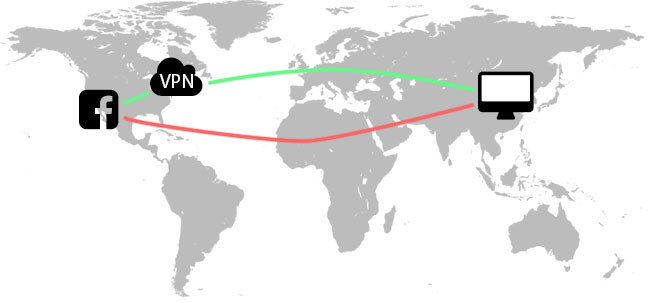
An extraAn extra layer of securityAlthough it is not strictly necessary, it is common for VPN connections to be accompanied by encryption of the packets that are transmitted with them, so it is normal to hear the recommendation that if you need to connect to a public WiFi access point, at least use you connect with a VPN.
Logging into your bank accounts while connected to a public WiFi network you don’t trust is probably not the best idea in the world, as it’s relatively easy for a thief to capture unencrypted packets and take over your user accounts. This is where the extra layer of security you can get with a VPN connection comes in, as the packets would be sent encrypted, so the listener probably couldn’t do anything with them.
However, there is fine print in this because while you mistrust the public WiFi network, you put all your faith in the VPN server, which can still capture all your traffic, keep logs of what you do, or even sell your bandwidth to the highest bidder. A VPN is only as secure and useful as its provider. If you don’t trust your VPN, don’t use it because instead of having an additional security layer, you will have the enemy at home watching everything you do online.
P2P downloads
Another common use for VPN connections is in P2P downloading, which these days is generally synonymous with downloading from BitTorrent. Before you put an eyepatch on me, a peg leg, and force me to go through the keel, VPN connections also have uses in P2P downloading, even if you download completely legal torrents.
Unfortunately, it is increasingly common for Internet providers to decide to poke their noses into how we send and receive zeros and ones on the Internet. Although they love that we visit normal web pages, they don’t like downloading: too much traffic, and you are probably downloading something illegally.
Some providers completely block P2P downloads, while others just boycott it so it malfunctions and you give up on yourself. Just as you can use a VPN to bypass censorship in your country, you can sometimes prevent your Internet provider from boycotting your P2P downloads.
Advantages of VPN connections
Now that we know what a VPN connection is and what it is for, it is time to summarize its advantages and disadvantages. First, the positive part:
- It works in all apps, routing all Internet traffic, unlike proxy servers, which you can only use in your web browser, and a handful of other apps that configure advanced connection options.
- It connects and disconnects easily. Once configured, you can activate and deactivate the connection at will.
- Additional security in WiFi access points, as long as the connection is encrypted, of course
- Fake your location; as we have seen in the previous section, a VPN connection is an effective way to avoid censorship or access content limited to a certain region.
- Your Internet provider cannot know what you do on the Internet. Don’t you want your ISP to know you spend hours watching kitten videos on YouTube? They won’t know what you do with a VPN, but beware, the company that manages the VPN will.
Things to keep in mind
So far, everything is very nice; VPN connections have advantages: more security, improved privacy, bypassing geo-blocks… Before you start buying a VPN service or signing up for a free one, there are a few sections What you should keep in mind:
- The price. Although there are free VPN services, you obviously can’t expect much from them as they will often be very limited, slow, or unreliable. There are some exceptions, however.
- The speed suffers. The difference between connecting to the Internet directly or having your data trace a path halfway around the world can be overwhelming. If your VPN server is very far away, you will experience a lot of latency when browsing the web. In addition to latency, it is normal for the maximum download and upload speed to be limited.
- Your security is not infallible. We have already said this several times, but it never hurts to repeat it. Just because the connection icon has a lock does not mean the connection is secure, especially if we are discussing VPN connections based on the PPTP protocol.
- They can’t always fake your location. Especially on mobile, there are more and more technologies by which you can triangulate and approximate your location beyond your IP address.
- They do not provide you with anonymity. Using a VPN does not mean that browsing is anonymous. The winning combination for greater anonymity, if we listen to Edward Snowden, is to use a VPN connection and Tor.
Use a third-party VPN… or create your server
The most normal and fastest way to start enjoying the advantages of VPN connections is to register with one of the many companies that offer VPN services. You pay a monthly fee ranging from a couple of euros to more than 10 euros, and you get the credentials to log into their service and often an official VPN client of your own, which makes things much easier for you.
However, if you want complete and absolute control of your connection or don’t trust anyone, you can follow the philosophy of “if you want something done right, you should do it yourself”. The problem with this is that it is rare that you have access to a PC in another country with which you can enjoy some of the advantages that we mentioned before (avoid censorship, blocks).
There are some exceptions, such as globetrotters who travel frequently, and by installing a VPN on their PC at home, they find they can continue accessing their files wherever they are, enjoying services only available in their country, such as Netflix. or Spotify.
OpenVPN is probably your best bet if you want to create your own VPN server, whether it’s on your Windows PC or a remote server under your control. You can download it from here, although you are warned that installing a VPN server is not as simple as pressing Next – Next – Next.
The most normal and fastest way to start enjoying the advantages of VPN connections is to register with one of the many companies that offer VPN services. You pay a monthly fee ranging from a couple of euros to more than 10 euros, and you get the credentials to log into their service and often an official VPN client of your own, making things much easier for you.
However, if you want complete and absolute control of your connection or you don’t trust anyone, you can follow the philosophy of “if you want something done right, you should do it yourself”. The problem with this is that it is rare that you have access to a PC in another country with which you can enjoy some of the advantages that we mentioned before (avoid censorship, blocks).
There are some exceptions, such as globetrotters who travel frequently, and by installing a VPN on their PC at home, they find they can continue accessing their files wherever they are, enjoying services only available in their country, such as Netflix. or Spotify.
OpenVPN is probably your best bet if you want to create your own VPN server, whether it’s on your Windows PC or a remote server under your control. You can download it from here, although you are warned that installing a VPN server is not as simple as pressing Next – Next – Next.
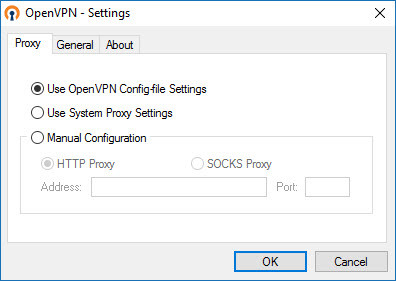
These guides may be useful to you:
- The official guide on how to install OpenVPN on Windows easily (in English)
- How to create and configure a VPN server
- Connect to any network securely
- How to install a VPN server on Mac (in English)
How to connect to a VPN server and where to configure it
Nowadays, every operating system in its more or less current version allows you to connect to a VPN without having to install anything additional. All you need are the login details of the VPN provider (or your company, if applicable), such as the server address, the VPN type, and your user credentials.
On windows
In Windows, it is possible to connect to a VPN network without installing anything additional from back in Windows XP. Still, support for the different types of encryption is more basic the older your version of Windows is.
To connect to a VPN network in Windows 7, follow these steps:
- Open the Network and Sharing Center
- Press Create a new connection.
- Choose Connect to a Work network
- Fill in the server information, VPN type, and your user credentials
In Windows 10, you can also use the following mode with the Modern Interface:
- Open the PC options.
- Go to Network and Internet
- Open the VPN section.
- Tap Add a VPN connection.
- Fill in the server information, VPN type, and user credentials.
On Mac
Support for VPN connections could not be missing on Mac OSX. To connect to a VPN connection on your Mac, follow these steps:
- Open System Preferences and click on Network
- Tap Add (+) at the bottom of the list of network services.
- Select VPN from the Interface dropdown.
- Fill in the other settings, such as the connection type and authentication settings.
On Linux
To connect to a VPN server from Linux, you must have the network-manager-vpnc package installed, which is not installed by default in Ubuntu. To install it, you can use the specific software manager of your distribution or the command line:
Then follow these steps:
- In Ubuntu, click the network icon (the two arrows) in the top bar.
- Choose VPN Connections – Configure VPN from the dropdown menu.
- Click add (or import if you have a configuration file)
- Follow the instructions on the screen to fill in the rest of the information, such as the encryption type and user credentials.
On Android
Android also has its own VPN client, although the way to access it may vary slightly depending on the version of Android you have installed and the modifications to the menus made by your manufacturer. You’ll usually find it here:
- Go to Settings
- Open the Wireless Networks, Network Connections, or similar section
- Generally, VPN connections are found in the Other or More Networks section.
- Tap on the VPN section and tap the Plus (+) button to create the connection
- Fill in the name, VPN type, server address, and encryption
On iOS
On iOS, the process is somewhat simpler. To connect to a VPN server from your iPhone or iPad, follow these steps:
- Open the Settings
- Go to the General section.
- Scroll until you reach the VPN section.
- Tap Add VPN settings.
- Choose the tab of the type of VPN of your server, and fill in the data of the server and username.

Sharlene Meriel is an avid gamer with a knack for technology. He has been writing about the latest technologies for the past 5 years. His contribution in technology journalism has been noteworthy. He is also a day trader with interest in the Forex market.










